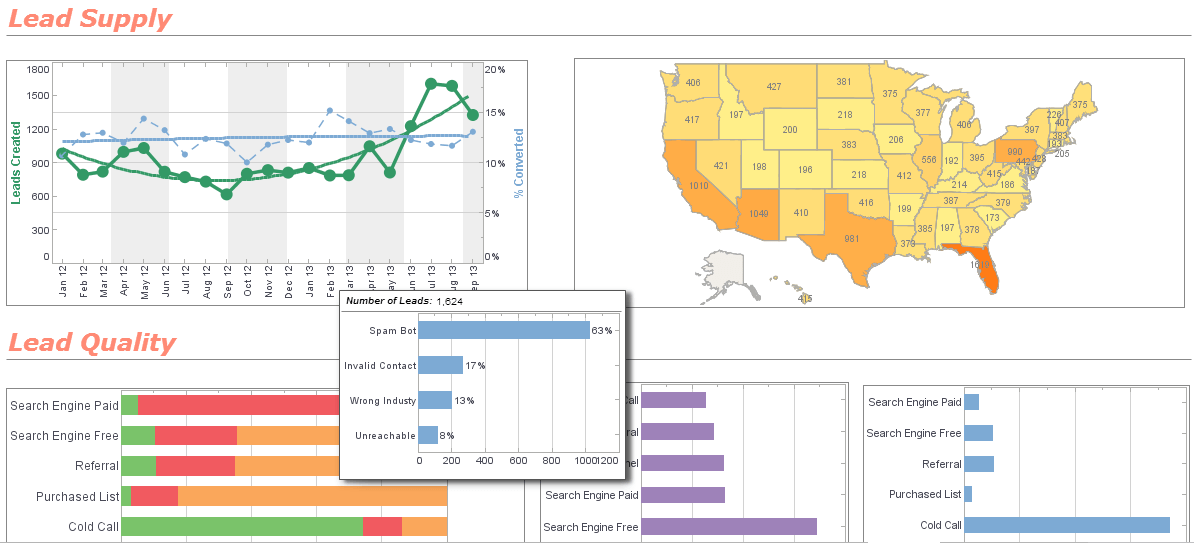What Are Options for Online Dashboard Software?
The market for online dashboard software is diverse, with solutions catering to different industries, technical expertise levels, and budgets. Below are some of the most widely used options, sorted alphabetically, each with its strengths and unique features.
1. Domo
Domo is a cloud-based platform that combines business intelligence, data integration, and dashboard creation. It is known for its ability to connect to a vast array of data sources and provide real-time insights. Domo’s user-friendly interface and mobile app make it accessible to users on the go. While its pricing is on the higher side, its comprehensive feature set and scalability make it suitable for enterprises with complex data needs.
2. Google Data Studio
Google Data Studio is a free, cloud-based dashboard tool that integrates seamlessly with other Google services, such as Google Analytics, Google Sheets, and BigQuery. It is an excellent option for small businesses or individuals looking for a cost-effective solution. Data Studio offers customizable templates, drag-and-drop functionality, and real-time collaboration. While it may lack some of the advanced analytics features of premium tools, its simplicity and integration with Google products make it a popular choice for marketers and small teams.
3. Klipfolio
Klipfolio is a cloud-based dashboard tool focused on simplicity and affordability. It is designed for small to medium-sized businesses that need to monitor KPIs and metrics without complex setups. Klipfolio supports integration with numerous data sources, including social media platforms, CRMs, and spreadsheets. Its strength lies in its ease of use and ability to create visually appealing dashboards quickly, making it a favorite among non-technical users.
4. Looker
Looker, now part of Google Cloud, is a business intelligence platform that emphasizes data exploration and collaboration. It allows users to create dashboards using a proprietary modeling language, which provides flexibility for advanced users. Looker is particularly strong in integrating with cloud data warehouses and supporting real-time data updates. It is best suited for organizations with data-savvy teams and a need for deep analytical capabilities.
5. Microsoft Power BI
Microsoft Power BI is a popular choice for businesses already using Microsoft products, such as Excel or Azure. Its cloud-based platform enables users to create visually appealing dashboards with seamless integration into Microsoft ecosystems. Power BI offers a user-friendly interface, AI-driven insights, and real-time data updates. It is particularly well-suited for organizations looking for cost-effective solutions, as it provides a free tier with basic functionality and affordable paid plans for advanced features.
6. Sisense
Sisense is designed for businesses that need to analyze complex datasets and create highly customized dashboards. It offers powerful data processing capabilities and supports a wide range of data sources. Sisense’s cloud-native architecture ensures scalability and performance, making it suitable for large organizations. Its embedded analytics feature allows businesses to integrate dashboards into their own applications, a unique selling point for software developers and product teams.
7. StyleBI
StyleBI, developed by InetSoft, is a cloud-based business intelligence platform known for its ease of use and flexibility. It features a drag-and-drop interface that allows users to create professional dashboards without coding knowledge. StyleBI supports a wide range of data sources, including CRM systems like Salesforce and SugarCRM, and offers real-time data visualization, multi-dimensional analysis, and mobile accessibility. Its open-source version provides transparency and extensibility, making it appealing for developers and organizations with custom needs. StyleBI is particularly praised for its rapid deployment and ability to handle data mashups, enabling users to combine disparate data sources for new insights.
8. Tableau
Tableau is a leading business intelligence and dashboard software known for its powerful visualization capabilities. It offers a cloud-based version that allows users to create interactive dashboards with drag-and-drop functionality. Tableau supports a wide range of data sources, including cloud databases, spreadsheets, and enterprise systems. Its strength lies in its ability to handle large datasets and provide advanced analytics, making it ideal for data analysts and large organizations. Tableau also offers robust sharing and collaboration features, though its pricing can be higher than some alternatives, which may deter small businesses.
9. Zoho Analytics
Zoho Analytics is a versatile dashboard software that caters to businesses of all sizes. It provides a user-friendly interface, extensive data integration options, and AI-powered analytics. Zoho Analytics is particularly appealing for organizations already using the Zoho suite of products, as it integrates seamlessly with tools like Zoho CRM. Its pricing is competitive, with plans suitable for small businesses and enterprises alike. The platform also supports mobile access and collaboration, making it a well-rounded option.
Choosing the Right Dashboard Software
Selecting the best online dashboard software depends on several factors, including the size of the organization, technical expertise, budget, and specific use case. Here are some considerations to guide the decision-making process:
- Business Size: Small businesses may prefer cost-effective options like Google Data Studio or Klipfolio, while enterprises might opt for Tableau or Domo for their scalability and advanced features.
- Technical Expertise: Non-technical users may benefit from user-friendly platforms like Zoho Analytics or Microsoft Power BI, while data analysts might prefer Tableau or Looker for their advanced capabilities.
- Integration Needs: Ensure the software integrates with existing tools and data sources used by the organization.
- Budget: Free or low-cost options like Google Data Studio are ideal for startups, while premium tools like Sisense or Domo cater to organizations with larger budgets.
- Collaboration Requirements: If real-time collaboration is critical, prioritize platforms with robust sharing and commenting features.
Benefits of Using Online Dashboard Software
Online dashboard software offers numerous benefits that enhance data-driven decision-making:
- Improved Visibility: Dashboards provide a centralized view of key metrics, making it easier to monitor performance.
- Time Savings: Automated data updates and pre-built templates reduce the time spent on manual reporting.
- Enhanced Collaboration: Cloud-based dashboards enable teams to share insights and collaborate in real time.
- Data-Driven Decisions: Visualizations and analytics help identify trends and patterns, enabling informed strategies.
- Scalability: Cloud-based solutions can grow with the organization, accommodating increasing data volumes and users.
Challenges and Considerations
While online dashboard software offers significant advantages, there are challenges to consider. Data security is a critical concern, especially for industries handling sensitive information. Ensure the chosen platform complies with relevant regulations, such as GDPR or HIPAA. Additionally, some platforms may have a learning curve, particularly for users without technical expertise. Finally, costs can escalate with premium features or additional users, so it’s essential to evaluate long-term expenses.


